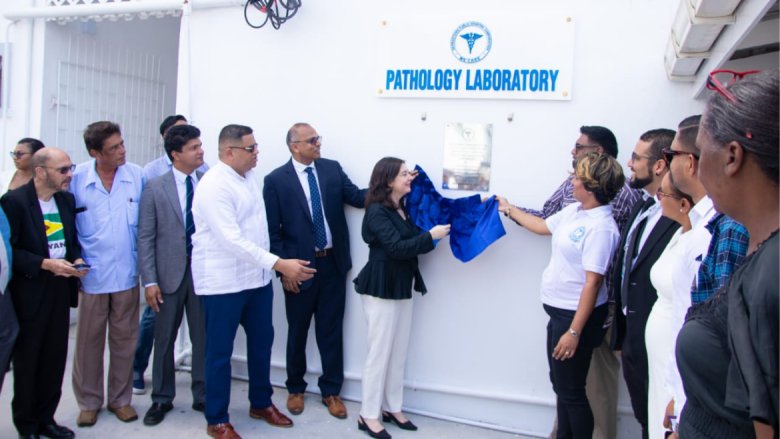Guyana's economy has been experiencing incredible growth thanks to its expansion of oil production, which has led to a substantial increase in its Gross Domestic Product per capita which was US$18,199 in 2022, up from US$6,477 in 2019. This has positioned the country as one of the fastest-growing economies globally, with a double-digit growth rate projected for this year. This growth has enabled Guyana to invest in infrastructure to support the development of other sectors, such as health.
As part of this drive to support Guyana’s development, the President of Guyana, Dr. Mohamed Irfaan Ali, recently commissioned a state-of-the-art pathology laboratory at the Georgetown Public Hospital Corporation (GPHC). As the only English-speaking South American country, Guyana is positioning and prioritizing its healthcare sector to ensure it is well-equipped to tackle any health challenge that may arise, both locally and regionally. At the commissioning, President Ali expressed his desire for Guyana to be seen as a regional healthcare hub for the Caribbean, with first-class services.
“Importantly, our ultimate goal is to make this lab available to all of CARICOM, to all of this region, because this is one of its kind in CARICOM now, and we wanted to be of service to CARICOM,” he said.
As Guyana plans to increase its service delivery network with six new hospitals across the country by the end of 2024, the GPHC will continue to serve as the main public hospital in the country, providing free healthcare services to its more than 800,000 people. Strengthening the lab at this key hospital hub was important to support the network expansion. Through funding from the World Bank, Guyana’s health ministry upgraded the hospital’s pathology department by purchasing critical pieces of equipment necessary for the laboratory to function effectively.
The new facility is now fully equipped with various tools and equipment, including a digital pathology scanner, tissue processors, centrifuges, microscopes, microscope cameras with software, printers for test results, workstations, specimen labels, solvent recycler, and other necessary supplies.
Previously, the laboratory turnaround time for specific tests ranged from 21 to 35 days since most tests were sent overseas to be analyzed. However, the lab reduced the time to as little as ten days and, on average, 14 days. With the introduction of a new facility, the lab can now produce results within seven days. Officials at hospital are optimistic that due to the new lab's favorable work environment and competent staff, routine test results can be expected within 48 hours, while urgent tests can be completed within 24 hours.
Diletta Doretti, Resident Representative for Guyana and Suriname, described the lab as a “game changer in terms of the speed at which the results will be provided” by the public healthcare system to the Guyanese population.
Additionally, she noted that the World Bank is fully supportive and aligned with Guyana’s goals for a longer-term focus on the institutionalization of a ‘one health’ agenda, strengthening preparedness, surveillance, and training key health professionals.
“The opening of the new lab is testimony to Guyana’s public health agenda. This state-of-the-art equipment will help modernize the analysis of samples but also, very importantly, support the introduction of telepathology capacity,” added Ms. Doretti. Telepathology is a medical practice which involves diagnosing and researching pathology remotely using image-rich data transmission.
Guyana's Minister of Health, Dr. Frank Anthony, stated that the country's new laboratory would offer advanced cancer diagnosis and treatment options beyond traditional X-rays, scans, ultrasounds, and mammograms. The lab will also help to update the country’s cancer registry with more accurate data and significantly contribute to cancer research. The Minister also shared that the new laboratory is just one example of how Guyana demonstrates the capabilities they have developed with the aid of resources from the World Bank.
“We are changing how we do medicine in Guyana. This laboratory will assist us to do that, if we are going to advance how we treat cancer in Guyana. We need to make sure that we can do the various types of testing to differentiate the types of cancers. We can look at which type would be more responsive to which type of treatment, and once we can do that, we would have better outcomes,” added Dr. Anthony.
The Ministry of Health and the World Bank have built a strong partnership through the COVID 19 Emergency Response Project, resulting in the implementation of the project with a budget of US$13.5 million. The project aims to improve case detection, tracing, and reporting, strengthen the health system and promote a ‘one health’ approach to preparedness, among other objectives, including through funding from the Bank’s Health Emergency Preparedness and Response Trust Fund.
Further, the World Bank has recently approved the Country Partnership Framework. This was developed with the Government of Guyana and partners on the ground as a strategic document that outlines on which areas the Bank will support the South American country and how. Health is one of the six areas identified within the Framework as a priority for engagement between 2023 and 2026. Strengthening public health preparedness - through activities such as boosting laboratory services - has been identified as a primary focus area.

